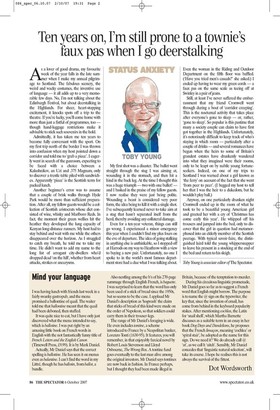Mind your language
I was having lunch with friends last week in a fairly swanky gastropub, and the menu promised a ballontine of quail. The waiter told me that ballontine meant that the quail had been deboned, then stuffed.
It was quite nice to eat, but I have only just discovered what the menu intended to say, which is ballotine. I was put right by an amusing little book on French words in English with the not fantastically funny title of French Letters and the English Canon (Timewell Press, £9.99). It is by Mark Daniel.
Actually, Mr Daniel says that the correct spelling is ballottine. He has seen it on menus even as balantine. I can't find the word in my Littre, though he has ballotin, from ballot, a bundle.
Also nestling among the b's of his 270-page rummage through English French, is baguette. I was surprised to learn that the word has only been used of a stick of bread since the 1950s, but so seems to be the case. I applaud Mr Daniel's description as 'hogwash' the claim that sticks of bread of this kind were made on the order of Napoleon, so that soldiers could carry them in their trouser-legs.
The range of Mr Daniel's foraging is wide. He even includes tontine, a scheme introduced to France by a Neapolitan banker, Lorenzo Tonti (1630-95). It features, you will remember, in that enjoyably farcical novel by Robert Louis Stevenson and Lloyd Osbourne, The Wrong Box. A tontine fund goes eventually to the last man alive among the original investors. Mr Daniel says tontines are now back in fashion. In France perhaps, but I thought they had been made illegal in Britain, because of the temptation to murder.
During his circuitous linguistic promenade, Mr Daniel goes so far as to suggest a French word that English might borrow. The purpose is to name the @ sign on the typewriter, the key that, since the invention of email, has come from behind in the keyboard popularity stakes. After mentioning cochlea, the Latin for 'snail shell', which Martha Barnette discusses as a suitable term in an essay in her book Dog Days and Dandelions, he proposes that the French limacon, meaning 'cochlea' or 'spiral stair', be adopted as the name for this sign. Do we need it? We do already call @ 'at', as we call h `aitch'. Sensibly, Mr Daniel concedes that 'linguistic natural selection', will take its course. I hope he realises this is not always the survival of the fittest.
Dot Wordsworth





























































 Previous page
Previous page